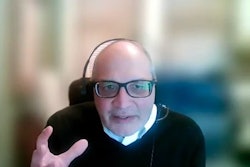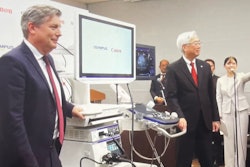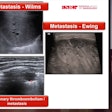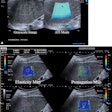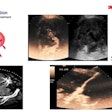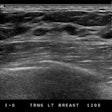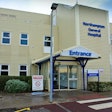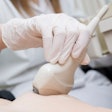Burnout is contagious and serious and trainees are most at risk due to stress factors such as long hours and financial instability, but much can be done to prevent it. This was the overriding message from expert speakers at a special ECR 2024 session organized by the Radiology Trainees' Forum on Wednesday.
The consequences of burnout will be felt at the individual and departmental level -- and these include decreased productivity, absences from work, behavioral problems within the workplace and at home, career dissatisfaction -- and potentially an increase in medical errors, according to Dr. Luis Curvo-Semedo, assistant professor of radiology at FMUC Universidade de Coimbra, Portugal.
 Chart shows burnout among medical specialty residents in Portugal, published by the Portuguese Medical Board. Yellow bar shows burnout among radiology residents which is not as high compared with other medical specialty residents. Chart courtesy of Dr. Luis Curvo-Semedo, and the Portuguese Medical Board.
Chart shows burnout among medical specialty residents in Portugal, published by the Portuguese Medical Board. Yellow bar shows burnout among radiology residents which is not as high compared with other medical specialty residents. Chart courtesy of Dr. Luis Curvo-Semedo, and the Portuguese Medical Board.
"Before entering a radiology program, residents must try to select the most suitable program. Get advice from other residents -- ask yourself if that particular program is the right one for you," he said, noting it is important to give feedback because usually there are ways that a residency program can improve conditions.
He also advised residents to reflect on a lowlight and a highlight of each working day, to acknowledge the bad and recognize the good. "Celebrate small personal victories, such as a well-performed procedure, a biopsy, a challenging diagnosis, or a patient that thanks you for your kindness."
Be there for others
Residents must also confide in other residents and be there for them in turn, and they should maintain relationships with people at medical school, family, and nonmedical friends, as well as nonradiology mentors. "Cultivate hobbies and interests outside of medicine. Above all, you are a person, a human being. Remember you have a life outside of being a doctor," Curvo-Semedo said, pointing out that he loves to collect vintage fountain pens and is a keen photographer.
 Portuguese physician Dr. Abel Salazar, (1889-1946) said "A doctor who only knows medicine doesn't even know medicine." A man of numerous talents, Salazar also honed his skills in painting.
Portuguese physician Dr. Abel Salazar, (1889-1946) said "A doctor who only knows medicine doesn't even know medicine." A man of numerous talents, Salazar also honed his skills in painting.
Residents should also make health a priority through exercise, eating well, and getting enough sleep. They should take time off for vacations and change their scenery. Mindfulness techniques may also be helpful, e.g., simply taking 10 minutes each day to sit in silence and "just be." He urged ECR attendees to spend money on something that will make life easier. This might be a parking spot next to the hospital or a home cleaning service or grocery delivery. Finally, residents need to learn to say no, personally and professionally for the sake of their well-being.
Change of mindset
Becoming a better "next generation radiologist" (the title of ECR 2024) will help counter feelings of burnout and depression that come from being increasingly overwhelmed, and part of the secret lies in reclaiming the word "clinician" and becoming more visible to colleagues and patients, according to Prof. Adrian Brady, current chair of the European Society of Radiology's (ESR) Board of Directors and immediate past ESR president.
Brady fears that public perception of radiology has changed little in a decade. Teleradiology, mismatched workloads, and the commoditization of specialists are among the factors that continue to keep radiologists hidden.
Changing mindset needs to start with radiologists themselves. He pointed to a U.K. survey that asked radiology trainees to rate the importance of various aspects of their work. A total of 55% said they didn't rate patient contact as very important, and it is this that needs to change, Brady noted.
He also flagged how damage was being done by misusing language. Radiologists themselves have created barriers by referring to other medical colleagues as "clinicians" and fellow professionals as "radiologists," he explained.
"This use of language in itself creates a barrier between radiologists and clinicians and misrepresents who we are and what we do. The Journal of the American College of Radiology even stated that we need to stop using the word clinician when what we really mean is 'referrer,' " Brady pointed out.
Patient-radiologist consultation
As patient empowerment continues to expand, patients are increasingly asking for direct access to their data and to medical consultants including radiologists, he told ECR participants, highlighting a 2019 ESR survey across 22 countries that showed 74% of patient respondents wanted a radiologist to be available to explain diagnosis to the patient, while one-third of respondents were not satisfied with their access to radiologists.
Radiologists should seize clinical opportunities: If an ultrasound patient asks the practitioner what can be seen on the screen, it is no longer acceptable for the practitioner to say that they will report the images and send the report to the referrer, Brady continued.
A Swiss-German study compared two groups of MRI patients: one group of patients returning home after MRI, the other spending four minutes discussing the imaging results with the radiologist. Around 81% of those meeting the radiologist perceived that this was an important part of good practice. Furthermore, the competency rating of the department went up in this group and the desire to be imaged in the future in a department that worked this way also increased.
Resistance to this change may come from referrers, with some studies suggesting that referrers didn't want radiologists communicating directly with patients at all, according to Brady. "So patients want something that referrers don't always want. Sorry, but we work for the patient, not for the referrer. Fundamentally patients want this and it is good for our specialty in terms of advertising what we do."
For more coverage from ECR 2024, please visit our RADCast.





